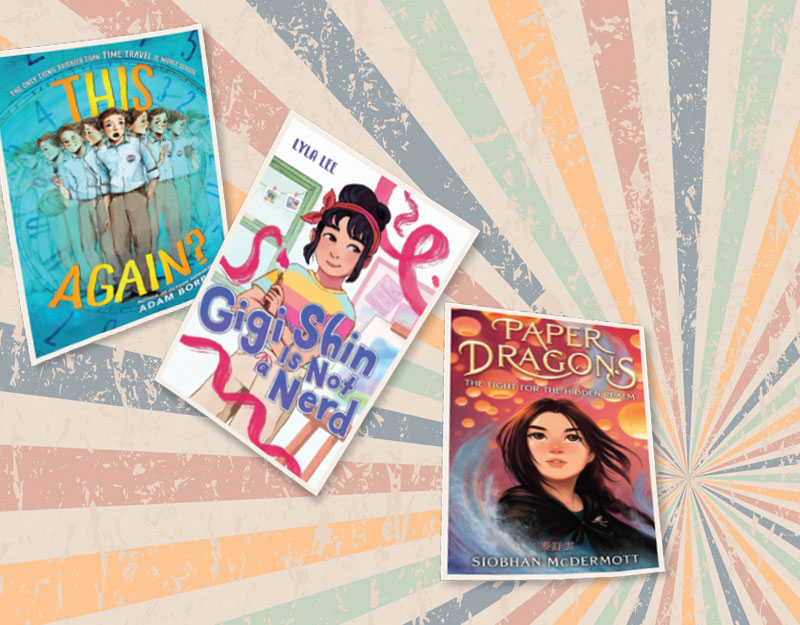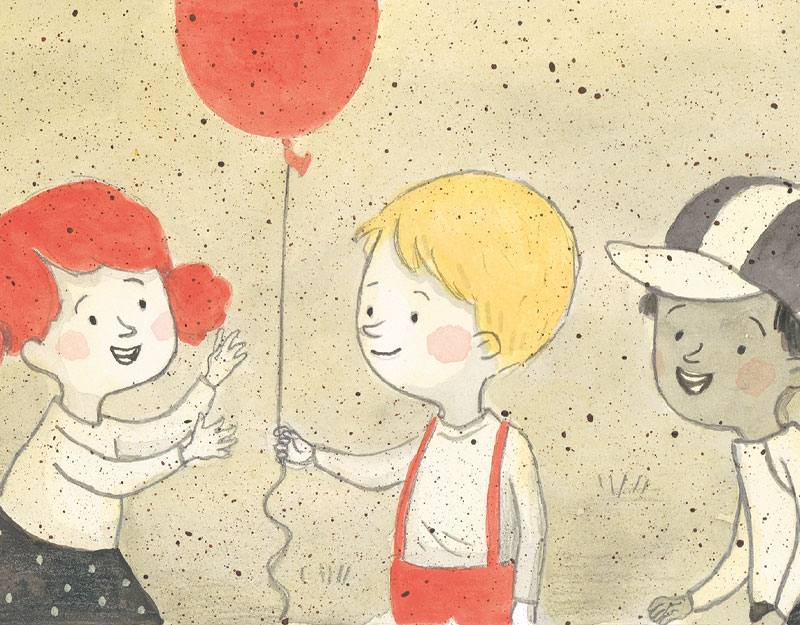ReRelease Alert!: The New York Review Children’s Collection
Reprinting old out-of-print children’s books for the modern consumer is an art. A real balance of taste, love, and a nose for hidden treasure. You have to be able to find books that have stood the test of time yet have not managed to remain in the public’s brain cells. How to go about it?
The good folks at The New York Review Children’s Collection have found the answer to that. They’ve a singular ability at finding magnificent titles, subsequently printing them in gorgeous new editions for one and all to see. Now they’ve two new books out that certainly deserve to be remembered. I’m not going to formally review them, but I would like to highlight them at the very least.
ADVERTISEMENT
ADVERTISEMENT

Example A: The Sorely Trying Day by Russell and Lillian Hoban
Did you know that Russell Hoban is alive and well in England? Yup. Fine as fishhair, if reports are to be believed. Best known alongside Lillian (1925-1998) for the Frances books (Bread and Jam for Frances, etc. etc.) the Hoban did more than just adorable badgers. There were tons of other books, like Emmett Otter’s Jugband Christmas. Less well remembered: The Sorely Trying Day.
Basic Premise: Father, wearing a pair of truly awesome spats (this is not important to the story… I just like spats), comes home to find his family up in arms. Says he, "is this the sort of welcome I get after a sorely trying day?" Oh, boo-hoo. In any case, there is a reason for the domestic madness. Each child in the family was put upon by someone else. Frank hit Dora because she sat on his ship. She sat on his ship because Emily splashed her with paint. Emily splashed her with paint because the dog got in the way. Eventually everyone decides it was originally the cat’s fault. The cat, in turn, blames the mouse who is willing to take the blame. That leads the cat to say, "Who do you think you are to put on such airs of nobility and unselfish heroism?" The cat refuses to eat the mouse and give him a hero’s death. Instead, he apologizes to the dog and so it goes in reverse. Everyone apologizes and all is well. Meanwhile, the mouse returns home to find his entire house in an uproar. Says he, "is this the sort of welcome I get after a sorely trying day?"
I feel that similar narratives have happened in a manner none too different from this book. There’s the old The Day Jimmy’s Boa Ate the Wash, which I’ve always seen as the picture book version of the film Memento. There are accumulative tales like The Apple Pie That Papa Baked. The nice thing about this book is that it goes in reverse then turns around and goes forward once again. Originally published in 1964 it’s entirely in black and white. Not ideal, but perfectly fine considering the circumstances. Lillian Hoban also draws a darn good mouse.
 Example B: The Bear That Wasn’t by Frank Tashlin
Example B: The Bear That Wasn’t by Frank Tashlin
Better known, perhaps, for writing and directing films like The Girl Can’t Help It and Artists and Models in the 1950s, Frank Tashlin had other pursuits as well. Specifically, in 1946 he put out this way-before-its-time nonconformist tale called The Bear That Wasn’t. If the title sounds familiar then you might be thinking of this:
 Though that film is more 1960s than anything, the original story was a post-WWII tale of a bear that comes out of hibernation to find that a factory has sprung up in his woods. Nothing he does or says convinces the men working there that he isn’t a fellow worker. The repeated line reads, "You’re not a Bear. You’re a silly man who needs a shave and wears a fur coat." Even trips to the zoo and the circus to discuss the matter with other bears doesn’t help. As the bears there point out, if he was a bear he’d be with them. At last, the bear accepts his fate, joins the workforce, and does so until the fall. One day he walks out and has the urge to hibernate. He thinks he’s just a silly man who needs a shave and wears a fur coat, but once he gets into his cave he is much happier. After all, deep down he never really believed it.
Though that film is more 1960s than anything, the original story was a post-WWII tale of a bear that comes out of hibernation to find that a factory has sprung up in his woods. Nothing he does or says convinces the men working there that he isn’t a fellow worker. The repeated line reads, "You’re not a Bear. You’re a silly man who needs a shave and wears a fur coat." Even trips to the zoo and the circus to discuss the matter with other bears doesn’t help. As the bears there point out, if he was a bear he’d be with them. At last, the bear accepts his fate, joins the workforce, and does so until the fall. One day he walks out and has the urge to hibernate. He thinks he’s just a silly man who needs a shave and wears a fur coat, but once he gets into his cave he is much happier. After all, deep down he never really believed it.
Apparently Tashlin disliked the cinematic version of his story. It’s strange to consider since Tashlin was an animator in the 40s and even worked on the military’s Private Snafu series "created by Frank Capra and Theodor ‘Dr Seuss’ Geisel". One reason for his unhappiness with the film was an early scene where the bear takes a cigarette and a cup of coffee. Tashlin felt that this was a symbol of the bear accepting his role as a man far too early in the story and that it upset the whole premise. A pity since I think Chuck Jones just knocked it out of the park with this one.
In any case, Tashlin also illustrated this book. It’s fun, it’s original, and it must have sold at least a few copies since he followed it up with The ‘Possum That Didn’t (1950) and The World That Wasn’t (1951).

Filed under: Uncategorized
About Betsy Bird
Betsy Bird is currently the Collection Development Manager of the Evanston Public Library system and a former Materials Specialist for New York Public Library. She has served on Newbery, written for Horn Book, and has done other lovely little things that she'd love to tell you about but that she's sure you'd find more interesting to hear of in person. Her opinions are her own and do not reflect those of EPL, SLJ, or any of the other acronyms you might be able to name. Follow her on Twitter: @fuseeight.
ADVERTISEMENT
ADVERTISEMENT
SLJ Blog Network
Happy Poem in Your Pocket Day!
More Geronimo Stilton Graphic Novels Coming from Papercutz | News
Parsing Religion in Public Schools
Environmental Mystery for Middle Grade Readers, a guest post by Rae Chalmers
ADVERTISEMENT








Just came across the NY Review edition of THE MAN WHO LOST HIS HEAD in our local library. Written by Claire Huchet Bishop and illustrated by Robert McCloskey. So brilliant and unique, my husband overheard me reading it to our 5-year-old and came to sit with us to follow it to the end.
I have a New York Review copy of The Magic Pudding by Norman Lindsay here that I’m about to read; someone recommended it in the Top 100 discussion.
A while back I was at a conference where the woman at the NYR table was collecting suggestions for children’s books to reprint. I offered Family Sabbatical by Carol Ryrie Brink.
I was pleased that the NYR had reprinted a favorite series, Carbonel, King of the Cats. I wish they would also reprint Barbara Sleigh’s Jessamy, which I like even better.
I’d love to see Barbara Sleigh’s Jessamy back in print–one of my favorites!
I’d also love to see Jennie D. Lindquist’s books in print again–The Golden Name Day, The Little Silver House, The Crystal Tree. My daughter loves these, too!
I have yet to read a bad book on the NYRB imprint, either childrens’ or adult. Their taste is impeccable.
I was really surprised at how many people love love loved the Bear That Wasn’t…since its reprinting I’ve had a small handful of perfectly respectable grownups who come in and ask for it by name.
Couldn’t they do The Winged Girl of Knossos?
I was so glad to see “The Bear That Wasn’t” – I first heard about it when Daniel Pinkwater and Scott Simon read it on NPR a couple of months ago. What an interesting story!! Thanks for highlighting these delights – and I still cherish my Emmett Otter’s Jugband Christmas…one of my favorites. 🙂